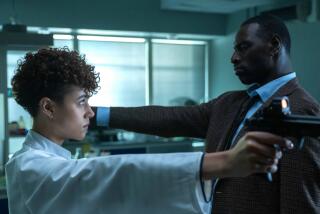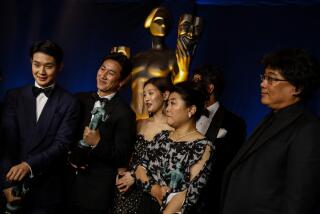A Second Look: Bong Joon-ho doesn’t follow form
- Share via
One of the most successful directors in South Korea and one of the best-known Korean directors internationally, Bong Joon-ho is the rare filmmaker who seems to work both within and beyond the confines of genre. His brisk, funny, extremely well-made movies deliver the familiar pleasures of pop entertainment, though often in unfamiliar configurations.
Bong has made four features (and a handful of shorts) and has been intriguingly hard to pin down from film to film. He made his debut in 2000 with “Barking Dogs Never Bite,” a portrait of big-city anomie centered on an anonymous Seoul apartment complex, then followed it with “Memories of Murder” (2003), a police drama based on the true case of a serial rapist and killer who terrorized a Korean backwater in the 1980s.
With his third film, “The Host” (2006), Bong turned to the venerable genre of the monster movie and ended up with the highest-grossing film in Korean history as well as an international hit. His latest, the melodrama “Mother” (2009), released in the U.S. earlier this year, tackles a monster in human form: a mother whose love knows no bounds.
As the Bong Joon-ho Collection, a new boxed set from Magnolia, attests, this is one impressive — and impressively varied — résumé, not least for a filmmaker who just turned 40 last year. (The set includes three of Bong’s four films; “Memories of Murder,” the exception, is available on DVD through a Palm Pictures edition released in 2005.)
Even though Bong’s films seem to fit established genres — serial-killer procedural, creature feature — they unfold unpredictably, almost in free-associative, detour-prone fashion. Individual scenes combine what seem like incompatible tones: Few filmmakers are as adept at bridging the gap between gravity and whimsy, tragedy and farce. To the extent that he has a default mode, it’s black comedy.
But the most startling — and the most gratifying — thing about Bong’s films is how often they open up to reveal unexpected depths; without lapsing into grandiosity or pretentiousness, all his stories are on some level social satires or allegorical reflections on national history or identity. In “The Host,” the mutant man-eating creature that erupts out of Seoul’s Han River arises from an American intervention and inspires a massively bungled response from the Korean authorities.
“Memories of Murder,” as David Fincher’s “Zodiac” would do a few years later, focuses on a crime without a solution (the killer was never caught) and emphasizes both the real-world conditions of imperfect knowledge and the culture of corruption and brutality endemic during the Chun military dictatorship of the ‘80s. “Mother,” for all its Oedipal specificity, is most potent as a parable of repressed trauma and willed amnesia.
“Barking Dogs Never Bite,” the one title here that is new to DVD (it is also being released individually), bristles with the restless invention of a debut film, but Bong’s seriousness and emotional maturity are already evident. His male protagonist, Yun-ju (Lee Sung-jae), is a poor, depressed graduate student pondering a dead-end future in the corrupt halls of Korean academia. Emasculated by a pregnant wife who’s also the family breadwinner, he’s also tormented daily by the endless yapping of neighbors’ dogs. His attempts to silence the pooches brings him into contact with Hyeon-nam (Bae Doo-na), a dreamy, rootless young woman who works in the building’s maintenance office. Connecting the dots between two lost souls, Bong never stoops to simple romantic solutions or cheap redemption.
For completists, there is also a Bong short within last year’s omnibus feature “ Tokyo!,” a triptych of Tokyo-set films made by non-Japanese filmmakers (the other two are Leos Carax and Michel Gondry). Bong’s segment, “Shaking Through,” details the delicate romance between a “hikikomori,” a shut-in who hasn’t left his apartment in years, and a pizza delivery girl.
The model of a mainstream artist who’s unafraid of risk, Bong could teach his American counterparts a lesson or two. His films fulfill some of the most basic mandates of commercial cinema — they tell satisfyingly dramatic stories with flair and intensity — but their particular genius lies in their sneaky intelligence, their subversive eccentricity, their capacity for surprise and even anarchy.
More to Read
Only good movies
Get the Indie Focus newsletter, Mark Olsen's weekly guide to the world of cinema.
You may occasionally receive promotional content from the Los Angeles Times.










